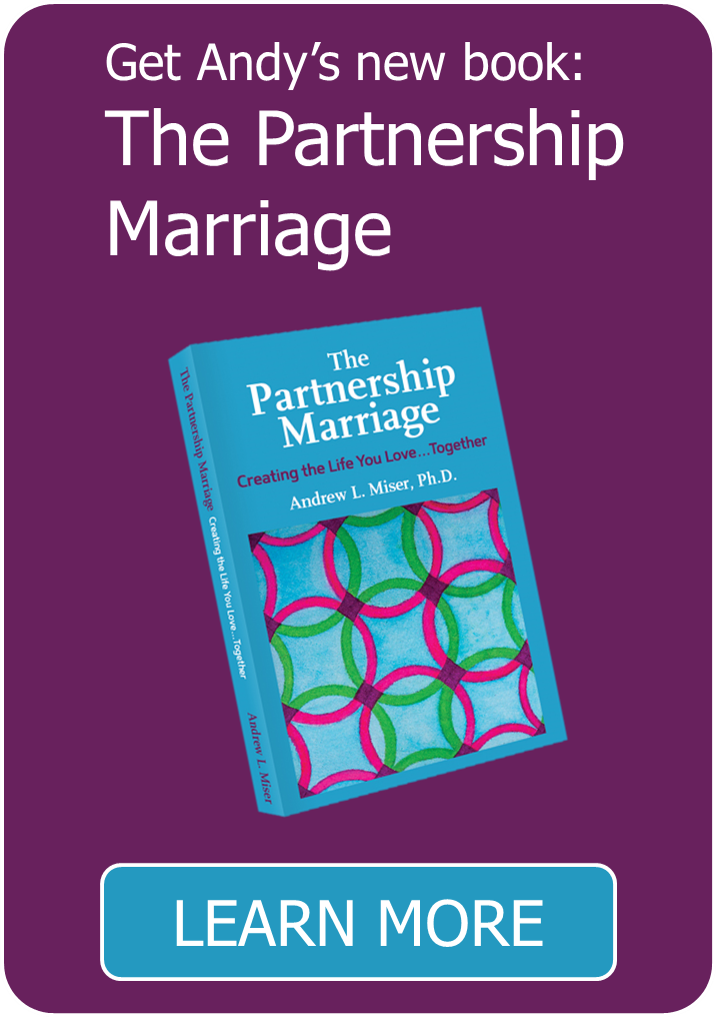Phase 3: Investing in Us
 The central focus in Phase 3 of a partnership marriage turns to the personal growth and success of each individual and to that of the marriage itself. This stage of marriage often begins in the fourth or fifth year of marriage when a couple is busy raising children, managing dual careers, managing their home and socializing with friends. In these early years of marriage, couples must learn to work and live successfully together while managing all these responsibilities.
The central focus in Phase 3 of a partnership marriage turns to the personal growth and success of each individual and to that of the marriage itself. This stage of marriage often begins in the fourth or fifth year of marriage when a couple is busy raising children, managing dual careers, managing their home and socializing with friends. In these early years of marriage, couples must learn to work and live successfully together while managing all these responsibilities.
Phase 3 is a time when both individuals in the marriage are asking questions that are at the very heart of who they are and what they are committed to. If you are in this stage, you may be asking yourselves, “Can I grow and develop in this marriage?” “Can I get what I really need and want?” “Can I fulfill my dreams in my marriage?” How you are able to meet each other’s needs, support each other’s goals and be real with each other has consequences for the long-term viability of your marriage. To accept each other, to grow and to be successful individually and together, both of you must commit to the quality of your marital relationship. This commitment is the major challenge of Phase 3 of a partnership marriage.
It is important to know that in this phase it is normal for you to re-assess and question your commitment to your marriage. You both may become disillusioned with each other, unable to come to grips with different parts of each other, such as personal habits, individual interests, attitudes, idiosyncrasies, political viewpoints, prejudices, etc., that are upsetting, troublesome or unacceptable. It is in this third phase of marriage when you may be asking, “Is this it?” or “Is this all there is?” and you each may be thinking “I’d be happier if you’d change!”
In Phase 3, the innocence of the first period of marriage gives way to a more mature re-examination of what each of you wants in the relationship. With time, you come to the realization that, for your relationship to work, each of you must be happy and able to fulfill your dreams in your marriage. You may need to shift your marital roles and household responsibilities. You begin to place a higher priority on balancing your individual goals with the teamwork necessary for your mutual satisfaction.
In Phase 3 of a partnership marriage, self-development and personal growth of each person take on a greater priority. You become more aware of patterns of interaction that don’t work and your part in those patterns. You become aware that you can’t change your spouse. You learn to accept your spouse for who they are and also for who they are not. You must learn to be responsible for what you want, make requests and negotiate with your partner so that you are mutually satisfied. It is incumbent on both of you to learn to communicate well and to bring self-awareness to the task of finding solutions that will work for your relationship.
The health and well-being of your relationship become a priority in which you both are able to support one another in getting your needs met, in fulfilling your goals and in caring for your quality of your marriage. You ultimately get committed to your commitment to accept each other, grow together and work successfully as partners in life.
Here are conversational tools that are important to in Phase 3 of a partnership marriage:
- Commit to having all four feet in your marriage. The struggle and the courage to create partnership require keeping both feet (in this case, all four feet) in the relationship and staying committed to the vision of a fulfilling and successful life together. When you have all four feet in your marriage, you are “standing together” for the quality of your marriage.
- Learn to fight fairly. When arguments and conflicts occur in your relationship, having ways to “fight fairly” is very important. Fighting fairly means that both of you have a mutual interest in taking care of the relationship as you work out your differences in a context of respect and understanding. Such conversations may be difficult, emotions may get heated and feelings expressed, but nobody gets hurt.
- Expand your self-awareness. Being aware of your role and responsibility in the quality of your relationships is paramount to being able to have great relationships with people generally and an enduring, loving partnership with your spouse specifically. Self-awareness begins with considering yourself as being at the origin of the quality of your life. That realization allows you to begin to observe or examine who you are, what points of view you have and what you are doing that is related to the quality of your interactions with your spouse. If your relationship is not working, ask yourself first what you might have to do with it. Look at yourself before you start looking at your partner. What point of view are you attached to and being right about? How are you being or what are you doing for which you’re not being responsible? What impact are you having that you may not be aware of? If your spouse is not happy, what are you committed to?
- Set aside time with each other to resolve issues that arise. Issues and problems are a natural part of life and, in this context, a natural part of marriage. An enduring, fulfilling marriage over a lifetime is not a marriage that is free of conflict, disagreement or argument, but rather one in which both persons in the relationship get their voices heard and their needs met, while at the same time take care of their relationship. When something is not working for you in your marriage, set a time to talk together to get the issue resolved. Remember, the issue might be a concern for only one of you. But if one of you has an issue, there is a problem for the two of you to resolve.
- Heal hurts in your relationship. There are times in every relationship when couples say (and do) things that are hurtful to each other and trigger feelings of anger, upset, disappointment, frustration, etc. At these times, you both will experience a break in connection or in being related. When one of you is feeling hurt and angry as a result of what your partner either said or has done, the sense of “us” is disrupted for both of you. If you can learn to express your feelings in responsible ways, resolve conflict, heal hurts and restore love and wholeness in your relationship, you have a great advantage in living a life of fulfillment and partnership. If you are committed to loving connection, teamwork and partnership in your marriage, you learn to restore your relationship to wholeness when hurtful things are said or done through apology, forgiveness and recommitment.
These conversational tools allow you to expand your awareness of your role in the problems you encounter with each other, solve those difficulties with greater ease and effectiveness and, ultimately, experience the strength and viability of your partnership and your marriage.
Reference
Miser, A. (2014) The partnership marriage: Creating the life you love…together. Charleston, South Carolina: Create Space Publishing.
Posted in Partnership Marriage
